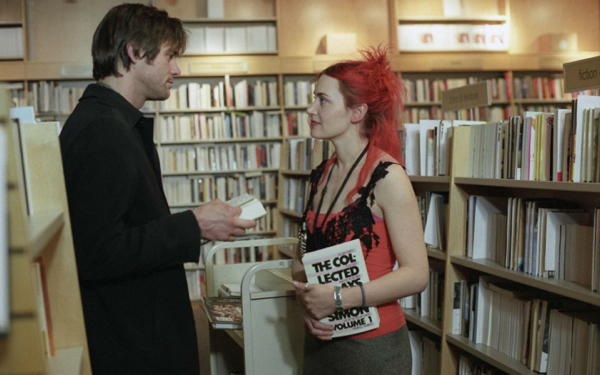Movie review by Greg Carlson
Even positioned as an early entry, “Eternal Sunshine of the Spotless Mind” is destined to be one of the best films of the year. The second collaboration between Gallic music video genius Michel Gondry (whose unbelievable clips for the likes of Daft Punk, the Rolling Stones, Bjork and the White Stripes almost literally burst at the seams with creative elan) and eccentric screenwriter Charlie Kaufman (who has also penned “Being John Malkovich” and “Adaptation” as directorial vehicles for Gondry’s fellow music video virtuoso Spike Jonze), “Sunshine” is a mind-bending tour-de-force of writing, directing, and acting that is both for and about the contents of one’s cranium.
While it resembles Kaufman’s other scripts in its concern for dexterous jumps in space and time as well as its preoccupation with mental interiority, “Sunshine” is far and away the most fully realized of the screenwriter’s filmed stories. While “Malkovich” hinted, often sardonically and skeptically, at the ruinous effects of misguided lust and unrequited love, “Sunshine” contains at its core a sweetly optimistic philosophy of the need for love and affection. Its protagonists deal with the full gamut of roller-coaster highs and lows, from the thrilling, endorphin-fueled rush of first attraction to the bitter resentment of turning into the boring couple you once pitied.
Jim Carrey easily betters his serious-minded turn in “The Truman Show,” displaying incredible subtlety and emotional restraint against the apparent odds. Cast partially, smartly against type as Joel Barish, a reserved introvert, Carrey is provided ample opportunity to demonstrate his remarkable psychological elasticity. At the very beginning of the movie, Joel meets aggressive free-spirit Clementine (Kate Winslet, completely smashing) on a train platform, and the déjà vu that accompanies their flirtations proves spectacularly ripe with layered meaning as Gondry and Kaufman catapult the audience an entire year into the relationship by the time the opening credits appear.
Once balance is temporarily regained, the immediacy of Joel’s situation reveals itself: post breakup, Clementine has hired Dr. Howard Mierzwiak (Tom Wilkinson) to have Joel entirely erased from her memory. Mierzwiak is the proprietor of Lacuna Inc., a storefront clinic with dubious medical credentials implied hysterically via the on-the-job incompetence and unethical behavior of memory-sucking technicians Mark Ruffalo and Elijah Wood. Devastated by Clementine’s harsh act, Joel signs up to undergo the procedure too, so that he can obliterate Clem from his own gray matter. Midway through the process, Joel realizes that he has made a mistake, and his efforts to hold on to experiences he shared with his sweetheart comprise the bulwark of Kaufman and Gondry’s fascinating head trip.
With the aid of Ellen Kuras’ perfect cinematography, which at times shoots blinding beams directly at the characters like cosmic flashlights or prison-tower searchlights, Gondry represents the multiverse of the mind with perfectly integrated special effects, many of them delightfully old fashioned. That having one’s memory eradicated carries with it unknown risks turns out to be only one of the movie’s concerns. By the time Gondry is deep into the labyrinth of Joel’s complex of synapses, the tone has shifted just enough to allow the audience to understand that losing the memory of a heartbreak will not really fix anything – it’s the pain that reminds us that we once had something real. Joel and Clem, desperately trying to outsmart the machinations of Lacuna’s extinguisher, make one of the most romantic pairs in recent cinema. They are, in fact, unforgettable.
